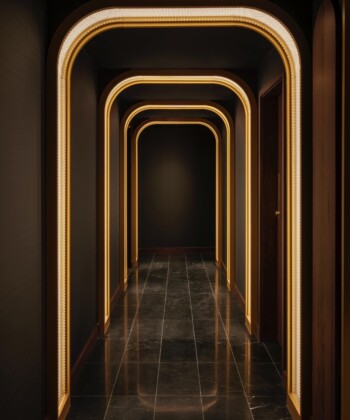We’ve been doing this quite a while,” said Cath, looking over her glasses at me with a wry grin. Her eyes returned to the swath of leather draped over the rim of a steering wheel as she slowly pulled strands of thick black thread through tightly spaced piercings in the blue and cream leather strips. One of just three individuals tasked with sewing Bentley’s steering wheels back in 2010, the year I visited the factory in Crewe, England, where Bentleys have been assembled since 1946, the affable sexagenarian—who I understand has since retired—said that each of them knows the others’ work: “Put any of us in a Bentley made in the last 30 years, and we can tell you which one of us sewed its wheel together.”
That’s what institutional knowledge looks like at Bentley Motors. It’s also exactly the sort of thing from which hand-built automobiles derive their indelible sense of warmth. But this was before the company added hundreds of new craftsmen and craftswomen to handle exploding sales, particularly on account of its Bentayga SUV, plus the technological developments that have brought new driving assistance and convenience features to the 100-year-old brand. So as I gripped the hand-stitched wheel of a third-generation 2020 Continental GT W12 coupe, followed shortly by a stint in a 2020 Continental GT Convertible V-8, I wondered if the influx of new blood, new ideas, and new technology had diluted that ineffable, organic character that has characterized Bentley cars for most of its history.
A Proper GT
Stylistically, the new Continental GT borrows much from its two predecessors, its signature fastback roofline, sweeping fenders, ovoid lamps, and wide chrome grille all brought forward in a carefully evolved fashion. But, particularly in person, the new Connie appears slinkier, more set back, more planted, more voluptuous, almost enveloped by its wheels. And it is all those things—the front wheels sit nearly half a foot farther forward in the body; the engine sits lower and rearward, thus elongating the nose, lowering the hood, and achieving proper GT proportions. The coupe’s lovely pillarless side windows remain, and chrome ring around the cabin of the convertible continues to define the ragtop’s countenance. New super-formed aluminum front fenders—“wings,” in Bentley-speak—are not only fluted and creased, but they also wrap around the entire front corner of the car, fully containing the gorgeous, etched “whiskey glass” headlamps, for a cleaner look and greater aerodynamics.

Fantastical Furnishings
Intimate yet open, sleek yet warm, tech-laden yet welcoming, the Continental GT’s contemporary cabin is, in my opinion, Bentley’s best ever. Sybaritic delights abound, naturally, from heated, ventilated, back-rubbing seats—with “neck warmer” vents on convertibles—to zillion-watt sound systems, multi-zone ambient lighting, and inebriatingly fragrant leather that covers everything that’s not polished or machined metal or some sort of screen. Newfound elegance comes by way of diamond-in-diamond leather quilting, with 712 stitches in each diamond, optional dual-wood veneers, and up to 20 knurled metal knobs and bezels.
Perhaps my favorite new feature, however, is a motorized rotating infotainment display, which presents the high-def touch screen on one side, with more formal analog instruments—chronograph, compass, and exterior temperature gauge—on the other. Not everything is new, though: The Continental retains the delightfully analog push-pull, organ-stop-style vent shutters that have graced Bentleys since our friend Cath was a kid. With so many ways to customize the fitments, you may need to consult the car’s designers for help (see sidebar), but regardless of color and trim choice, the new Connie offers a sheer sense of occasion without rival in the GT market today.
Leaner, Meaner
Bentleys have long been known for their composed ride and formidable power, but with 200 fewer pounds, better distribution of the weight that remains, and an all-wheel drive system that operates in rear-wheel drive until slippage occurs, the new Continental demonstrates eagerness more akin to a Ferrari than a Phantom. Precision is remarkable. Grip is outstanding. Even the steering has life to it, a rarity among cars of this sort. While Bentleys have always been satisfying, high-speed interstate sleds, these are the first Continentals I went out of my way to drive on mountain roads. And apparently, I wasn’t alone: Not two weeks following my test drives, the Continental GT set the world record for production cars at the annual Pikes Peak International Hill Climb race.
As before, Continental GT coupes and convertibles offer a choice of eight or 12 turbocharged cylinders under the bonnet, and, as before, the V-8 is both more efficient and more entertaining, with its guttural exhaust note and a stout 542 horsepower. The 626-horsepower 12-cylinder is all new and delivers a breathtaking shove when provoked, all in eerie silence. From a standstill, highway speeds are just 3.5 to four seconds away, and Bentley claims that, given enough flat road, the 12-cylinder Continental GT can reach an eye-watering 207 mph.
Happily, whether I was casually cruising or canyon-carving, that divine sense of handcrafted uniqueness was omnipresent, as though everything I touched, from the dash-top stitching to the lacquered veneers to the faceted knobs, and certainly the steering wheel, contained the hidden signature of the person who fashioned it. Sure, it exudes sex appeal, prestige, and high performance. But for me, the most impressive aspect of the new Continental GT is how close it brings you to the people who created it.

Dream-Building: Bentley’s New Co-Creation Program
Does Julep paint look gold or green? Would two-tone leather and dual-wood trim look too busy? Should I order the convertible with the new twill fabric roof? Are there any off-the-menu features I should consider to make my Continental GT really one of a kind?
The 2020 Bentley Continental comes in more than 80 paint colors, with eight wheel choices, 15 primary and 11 secondary leather hues, eight veneer materials, and carpets that match or contrast with the leather. And that’s just what’s listed on the menu. Indeed, the Continental GT’S color, trim, and equipment combinations offer a nearly infinite number of ways to make a Bentley awesome. But a little guidance could help, right? If only you could call up someone to tell you what works and what doesn’t… You know, like the car’s designer.
Who’s to say you can’t? That’s right, Bentley’s new Co-Creation service puts customers in contact with members of its design team—perhaps the very designer of their new Bentley-to-be—to help them decide what features to add, which to skip, and what colors and textures to apply to it all. We all know how cars can take on certain characteristics in one color and look completely different in another, and while Bentley’s online configurator is one of the best, having access to designers who understand the car’s nature, inside and out, seems worth exploring. By access, we’re not talking about a cursory phone call or email exchange, but rather a true co-creation process that will allow designers to stay involved for as long as it takes. The service is offered through local Bentley dealerships, and best of all, there’s no charge for the advice.









































